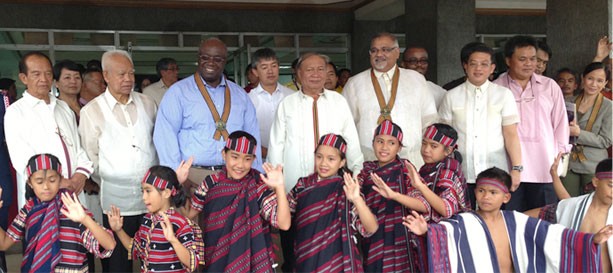
For Immediate Release
Baguio -- As part of its commitment to enhance the capacity of Philippine communities to prepare for, and respond to, natural disasters U.S. Ambassador Harry K. Thomas, Jr. announced the start of the third phase of the U.S. Government’s Disaster Risk Reduction (DRR) program in Benguet.
Local government leaders led by Benguet Governor Nestor Fongwan, U.S. Embassy Manila’s United States Agency for International Development (USAID) Mission Director Gloria D. Steele, representatives from the World Food Program (WFP), University of the Philippines-Baguio and Jaime V. Ongpin Foundation, Inc. were present during the event.
“We are pleased to work with communities in Benguet and throughout the Philippines to improve their capacity to deal with the effects of natural calamities. Our efforts recognize that disasters could easily wipe out the assets that our families have worked hard to gain,” Ambassador Thomas said.
USAID’s DRR program in Benguet, implemented in partnership with WFP, began in 2011 and initially covered the municipalities of Tublay, Atok, Kibungan and Kapangan. Activities included tree planting, development of early warning systems, and preparation of disaster contingency plans for each municipality.
The third phase has now expanded to cover six municipalities, including the Municipality of Buguias and the City of Baguio and will also provide P17.6 million (US$ 420,000) to support implementation of practical and high-impact projects at the local level to help communities prepare for disasters.
The DRR program also includes the creation of a Knowledge and Training Resource Center in partnership with the University of the Philippines-Baguio. Another partner in this activity is the Jaime V. Ongpin Foundation, which will provide training and information campaigns on effective disaster planning and response for local leaders and community members.
“The center will help communities gain access to training and valuable information that will help them prevent or minimize the impact of natural disasters,” Ambassador Thomas remarked.
The assistance is part of the over P294 million (US$7 million) support already provided by the U.S. Government, through USAID, in FY2013 for disaster risk reduction activities in the Philippines.
Mission Director Steele said, “We are putting major emphasis on supporting vulnerable communities to address current and emerging needs in risk reduction and we expect to invest more on disaster risk reduction activities within the year.”







Comment
Make a general inquiry or suggest an improvement.